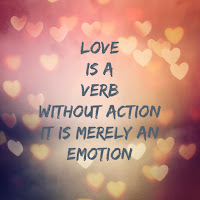I’ve posted about this subject before
so writing this blog was not a difficult one. Have you ever had someone tell
you when you were upset, “Don’t be upset?” Doesn’t really help, does it? Many
times when someone does that, it just leads to feeling more upset. This type of
situation typically induces thoughts such as, “If I could turn it off, I
would,” and “Oh, ok, because you told me to not be upset then I won’t.” The
thought that we have no control over our emotions is rampant throughout our
culture. For example:
“You can’t help what you feel.”
“That’s just how I feel. I can’t help it.”
“I wish I could change the way I feel, but I just can’t.”
“I can’t help but love him/her.”
(Cute picture. Stupid quote.)
I challenge the idea that we have no control over our
emotions. I think people who say the previous phrases are not giving themselves
nearly enough credit. Doing so makes us a victim of our own emotions when
emotions were to make things interesting, not to tether us to negativity.
Our emotions and our resulting behavior stem from what we
tell our selves about the given situation. One boy gets rear-ended in traffic
and goes ballistic on the other driver. Another boy in the same situation
calmly gets out of his car and exchanges insurance information. What makes
these boys different from one another? If our emotions are controlled by our situation,
then these boys should have reacted the same way. However, the first boy was
telling himself that being rear-ended was unacceptable and shouldn’t have
happened. This belief led to his meltdown. The second boy was telling himself
that this situation is unfortunate but it could have been worse. This belief
led to him being calm and doing what was necessary to resolve the situation.
The first boy was a victim of his own emotions and the second was empowered by
his emotions.
Let’s talk about love, shall we? Now, I don’t believe love
to be an emotion but that’s a blog for another time. Love is, however, another
place that people have a tendency to believe that they have no choice.
Recently, on a popular TV show someone uttered the statement, “You can’t help
who you love.”
Not true. You can. God created us with a heart AND a brain.
God gave us a command to love. John 13:34-35 says, “I give you a new command:
Love one another. Just as I have loved you, you must also love one another. By
this all people will know that you are My disciples, if you have love for one
another.” If you couldn’t help who you love then God’s command to love one
another would be redundant or at worst, a trap setting us up to fail. What
makes a command a command instead of a statement is that the person being
commanded has a choice to comply or not. If we had no choice then the scripture
passage would read, “I give you a new statement: We will love one another.”
Jesus chose to love us and thus we choose to love one another….or to not love
one another.



No comments:
Post a Comment